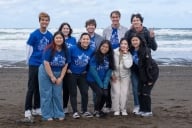You have /5 articles left.
Sign up for a free account or log in.
John Milios, associate professor of political economy and the history of economic thought at the National Technical University of Athens, was expecting to explain some of his ideas about class and politics when he flew to the “How Class Works” conference at the State University of New York at Stony Brook this month.
He just wasn’t expecting to do it in detainment at the airport.
According to e-mails Milios sent to colleagues, he was held and questioned for hours upon his arrival at John F. Kennedy International Airport in New York City on June 8.
Milios was ultimately sent back to Greece by federal authorities, because of, he wrote, alleged “visa irregularities.” Milios added that he “had travelled to the United States on exactly this visa several times in the past and had just checked with the U.S. Embassy in Athens before coming to confirm that the visa was valid even though it was in the final six months of its 10-year duration.”
Milios wrote that the questioning “focused on my political beliefs and affiliations, which I find totally repellent, an extravagant theatre of the absurd, and a clear clue of the extremist right-wing policy of the present-day U.S. administration." His story, which has not hit the mainstream media in the United States, was front page news in Greece.
Milios is a member of the the Coalition of the Radical Left (SYRIZA), a Greek opposition party. In one of his e-mails, Milios wrote that SYRIZA, as well as the Greek Socialist and Communist Parties drafted resolutions “condemning the United States for this action.”
Michael Zweig, professor of economics at Stony Brook and organizer of the conference, said in a statement that he was “embarrassed” at the “unacceptable political intrusion into the flow of ideas and intellectual work across borders.”
Milios was expected to present as part of a panel titled: “Class and the Distribution of Income in the United States.”
The U.S. Customs and Border Protection did not have an immediate response to questions about Milios.
After 9/11, many academics were dismayed at what they called overly strict visa procedures that sent the number of foreign students into a downward spiral.
Even as visa restrictions have improved, according to both colleges and the State Department, potentially embarrassing instances like Milios’ ordeal crop up from time to time.
In 2004, Tariq Ramadan, who is Swiss and is considered one of the world’s leading scholars on Islam, had his visa revoked, preventing him from assuming a position as a visiting professor at the University of Notre Dame.
Last year, the American Association of University Professors joined in a lawsuit against the federal government with the American Civil Liberties Union and the PEN American Center, in the hopes of obtaining documents about why certain scholars have been turned away. One of the examples cited in the lawsuit involved a group of Cuban scholars who were turned away from attending a conference in the U.S.
In one of the most high profile visa faux pas, Goverdhan Mehta, an Indian chemist and president of the International Council for Science, a coalition of national and international unions of scientists, said he was grilled about his research and accused of hiding information, according to news reports.
Like Milios, Mehta was not a rookie traveler. He had worked as a visiting professor at the University of Florida, the institution to which he was traveling for a conference when he was stopped. Mehta had decided not to come by the time U.S. officials offered him a visa.








